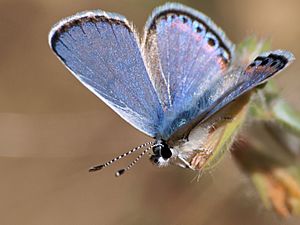Lupine blue facts for kids
Quick facts for kids Lupine blue |
|
|---|---|
 |
|
| Scientific classification | |
| Kingdom: | |
| Phylum: | |
| Class: | |
| Order: | |
| Family: | |
| Genus: |
Icaricia
|
| Species: |
I. lupini
|
| Binomial name | |
| Icaricia lupini (Boisduval, 1869)
|
|
| Synonyms | |
|
|
The lupine blue (Icaricia lupini) is a small, colorful butterfly. It belongs to a group of butterflies called the Lycaenidae family. These butterflies are often called "blues" or "coppers" because of their colors. You can find the lupine blue butterfly in North America.
Contents
Meet the Lupine Blue Butterfly
Where It Lives
This butterfly lives in many parts of western North America. You can find it in southwestern Canada. It also lives throughout the mountainous and western United States. It even reaches into northern Mexico. These butterflies enjoy areas with lots of sunshine and specific plants.
What It Looks Like
The lupine blue butterfly is quite small. Its wingspan is usually between 22 and 29 millimeters. That's about one inch wide! Like many butterflies, its wings have beautiful patterns. The males often have bright blue wings, while females might be duller.
Life Cycle and Food
The lupine blue butterfly goes through a complete life cycle. This includes egg, larva (caterpillar), pupa, and adult stages.
When They Fly
Adult lupine blue butterflies are usually seen flying from June to August. This happens in places like the Sierra Nevada mountains in eastern California. In other areas, they might have several generations. This means you can see them flying from March to July.
What They Eat
The young butterflies, called larvae or caterpillars, eat specific plants. They especially like plants from the Eriogonum genus. Two of their favorite foods are Eriogonum umbellatum and Eriogonum fasciculatum. Adult butterflies do not eat these plants. Instead, they drink sweet nectar from flowers. This nectar gives them energy to fly and lay eggs.
Caterpillar Hairs
It's good to know that the hairs on these caterpillars can sometimes cause a mild skin rash. This rash is called urticaria. It's a good idea to avoid touching caterpillars you don't recognize.
Subspecies
Scientists have found different types of lupine blue butterflies. These are called subspecies. They might look slightly different or live in different areas. Some known subspecies include:
- Icaricia lupini lupini (found in California)
- Icaricia lupini monticola (found in California)
- Icaricia lupini chlorina
- Icaricia lupini texanus (found in Arizona)
- Icaricia lupini argentata (found in California)
 | Jewel Prestage |
 | Ella Baker |
 | Fannie Lou Hamer |

